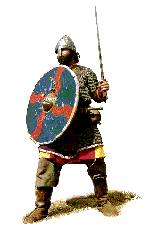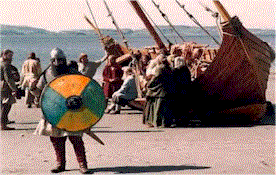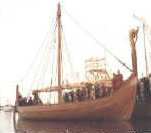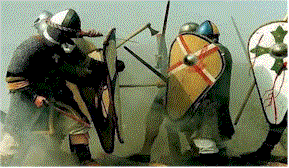|

Thweatt


| |
 
 he
Norseman was a mighty individualist and it was a long time before he could
be brought to bow to any sort of authority. Little is known of these earlier
dwellers of the North except that they were short of stature and dark-skinned,
that they were cave dwellers and, in successive stages of development,
used stone and bronze, iron tools and weapons. Ancient Norsemen were not
farmers, but hunters and fishermen. he
Norseman was a mighty individualist and it was a long time before he could
be brought to bow to any sort of authority. Little is known of these earlier
dwellers of the North except that they were short of stature and dark-skinned,
that they were cave dwellers and, in successive stages of development,
used stone and bronze, iron tools and weapons. Ancient Norsemen were not
farmers, but hunters and fishermen.
 hrough
the years it had grown more difficult to find food along the rocky slopes
of Norway and Denmark; and when this condition has existed in man's history,
man has elected to migrate. The tribes in the North grew, in time, to
have many peculiarities of their own and, as their country grew more populous,
they needed more things that could not be obtained easily. So the fashion
of plundering began to prevail, until much of the industry of Scandinavia
was connected with the carrying on of an almost universal fighting and
marauding. Ships must be built and there must be an endless supply of
arms and weapons. hrough
the years it had grown more difficult to find food along the rocky slopes
of Norway and Denmark; and when this condition has existed in man's history,
man has elected to migrate. The tribes in the North grew, in time, to
have many peculiarities of their own and, as their country grew more populous,
they needed more things that could not be obtained easily. So the fashion
of plundering began to prevail, until much of the industry of Scandinavia
was connected with the carrying on of an almost universal fighting and
marauding. Ships must be built and there must be an endless supply of
arms and weapons.
  ith
hunger and eventual starvation facing the future, they looked across the
channel. In 787, the Anglo-Saxon Chronicle tells us, there "first
came three ships of Norsemen out of Haeretha-land (Denmark)." These
were the first ships of Danishmen who sought the land of the English nation.
In 855, the Old English Chronicle tells us, "The heathen men, for
the first time, remained over winter in Sheppey," at the mouth of
the Thames, and thereafter, year by year. ith
hunger and eventual starvation facing the future, they looked across the
channel. In 787, the Anglo-Saxon Chronicle tells us, there "first
came three ships of Norsemen out of Haeretha-land (Denmark)." These
were the first ships of Danishmen who sought the land of the English nation.
In 855, the Old English Chronicle tells us, "The heathen men, for
the first time, remained over winter in Sheppey," at the mouth of
the Thames, and thereafter, year by year.
 n 878, during mid-winter, "the
army stole n 878, during mid-winter, "the
army stole away to Chip penham and over-ran the land of the West-Saxons
and sat down there." The Thweatt ancestors was among these earlier
arrivals in England. We learn that there was a place named Thwaite in
East Anglicia prior to the conquest of 1066. In modern times, the spelling
may be different, but the family name is common in Denmark and especially
Norway spelled as Tvet or Tveit according to Wigo Scramm, project director
of the Viking Network in Fetsund, Norway. away to Chip penham and over-ran the land of the West-Saxons
and sat down there." The Thweatt ancestors was among these earlier
arrivals in England. We learn that there was a place named Thwaite in
East Anglicia prior to the conquest of 1066. In modern times, the spelling
may be different, but the family name is common in Denmark and especially
Norway spelled as Tvet or Tveit according to Wigo Scramm, project director
of the Viking Network in Fetsund, Norway.
|